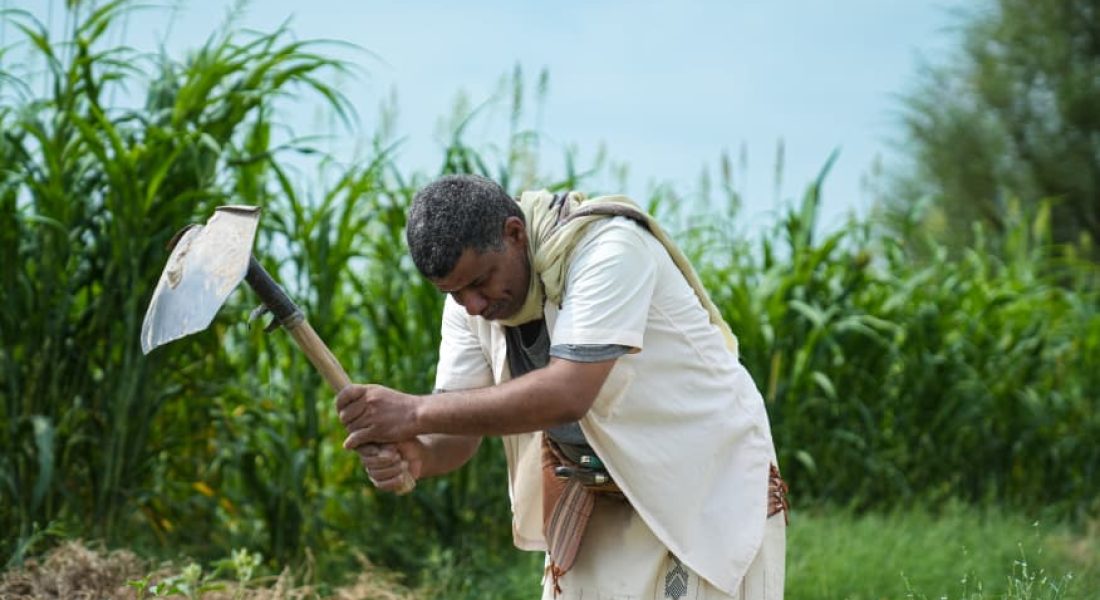Yemen’s long conflict has left a trail of devastation that reaches far beyond the front lines. Roads, markets and entire farming regions remain scarred by landmines and unexploded ordnance. For millions of Yemeni families, the consequences are measured not only in lives lost or injuries suffered, but in empty fields, soaring prices and daily struggles to find enough food.
The International Day of Awareness of Food Loss and Waste is a global reminder that food security depends on more than production. In Yemen, the link between explosive hazards and food loss is direct and urgent: land that cannot be farmed is land where harvests are lost before they begin.
Before the war, agriculture was the backbone of Yemen’s economy and a source of income for more than 70% of households. Farmers grew staples such as wheat, sorghum, millet, lentils, beans and a range of fruits and vegetables. Rural markets thrived on local produce, and traditional dishes such as saltah, bint al-sahn and daily flatbreads relied on these homegrown ingredients.
Today, much of this farmland remains inaccessible. Mines and unexploded ordnance are buried in fields, irrigation channels and grazing areas. Farmers returning to their land cannot plough or harvest without risking their lives. Fertile soil lies idle, and food that should be grown, stored and eaten is lost before it ever reaches a market. This is food loss in its starkest form, essentially production stopped at the source.
Yemen has always relied heavily on food imports, but the war has pushed that dependence to dangerous levels. More than 90% of the country’s food supply once came from abroad, with cereals such as wheat accounting for nearly all domestic consumption. Today, the import system is fragile and expensive.
Total food imports in 2022 dropped to about 93% of 2019 levels, while wheat flour imports fell to less than half of their pre-war volume. Key supply routes are repeatedly disrupted by conflict, checkpoints and damaged infrastructure. Ports such as Hudaydah remain critical but vulnerable, and long overland transport routes are often unsafe.
These disruptions translate directly into higher prices. Yemen’s economy has contracted sharply, and its currency has lost much of its value. Real GDP per capita has fallen by more than half since the war began. In early 2024, food inflation reached over 11% year-on-year. By mid-2025 the cost of a basic food basket was around 40% higher than a year earlier. For families whose incomes have collapsed, even everyday staples (wheat flour, rice, lentils, beans, sugar, and cooking oil) are increasingly out of reach for the majority.
When farmers cannot plant or transport crops, Yemen loses more than food. Every abandoned field represents wasted water, labour and seed. Each disrupted supply chain adds to national food loss and undermines the resilience of local markets. In a country where millions are already food insecure, these losses deepen hunger and malnutrition.
Project Masam is working to break this cycle.
Since mid-2018, Masam teams have cleared hundreds of thousands of landmines, improvised explosive devices and unexploded ordnance, opening tens of millions of square metres of land for safe use. Each cleared hectare returns fertile soil to farmers and allows families to resume planting, harvesting and selling produce.
A safety operation, clearance is also s foundation for rebuilding local food systems. Safe land means farmers can grow crops that reduce dependence on volatile imports. Reliable harvests support markets, stabilise prices and create sustainable food sources for communities cut off from trade.
Reducing food loss and waste is critical to global food security, but in Yemen the first step is making the land itself safe. Without clearance, efforts to improve storage, transport or consumption will falter because production cannot begin.
“Clearing landmines is essential for restoring Yemen’s ability to produce food. When land is made safe, farmers can return to their fields, plant crops and bring harvests to market. This reduces dependence on imports, stabilises food prices and supports the recovery of the national economy,” Project Masam’s Managing Director Ousama Algosaibi said.
“Our work is a practical step toward food security and sustainable agriculture.”
On this International Day of Awareness of Food Loss and Waste, Project Masam calls attention to the important link between demining and food security. Clearing mines restores livelihoods, strengthens local economies and gives communities the chance to feed themselves.

